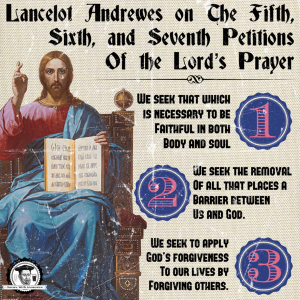
1.1K
Downloads
12
Episodes
What would it be like to grab a brewski with Bishop Lancelot Andrewes? Fr. Michael and Fr. Allen of St. Michael the Archangel Anglican Church Charolette invite you to the table for a drink and to discuss the works of this quintessential Anglican and famous Caroline Divine in order to see what he would have to say about the world in which we live.
Episodes

Saturday Jan 02, 2021
Episode Eight: On the Lord's Prayer, Pt. 3
Saturday Jan 02, 2021
Saturday Jan 02, 2021
Episode Eight: The Lord’s Prayer, Pt.3
Andrewes on Asking for Our Daily Bread and
Seeking the Forgiveness of Our Debts as We
Forgive Our Debtors
Dec.12, 2020
Sermons 13 - 15 of Lancelot Andrewes’
Nineteen Sermons upon Prayer in General,
and The Lord’s Prayer in Particular.
Copies can be found in Lancelot Andrewes Works,
Sermons, Volume Five, or on The Project Canterbury Website.
Summary:
With the 7th, 8th, and 9th sermons of this 13-sermon collection on the Lord’s Prayer, Andrewes teaches on the often over-looked, or unconsidered, realties contained in the intentional wording of “Give Us This Day Our Daily Bread” “Forgive Us Our Debts,” and “As We Forgive Them That Trespass Against Us.”
Outline:
- “Give Us This Day Our Daily Bread”
- Introduction
- We now move from the eternal petition for glory and the spiritual petition for grace, to the natural, temporal petition for necessities to live and to be able to serve God.
- Only after first seeking the Kingdom, then for the fulfilling of God’s will, and finally the righteousness God requires, are we to seek the things we stand in need of.
- The Petition Itself for God’s Giving
- The benefits of our asking God to give
- We confess that we are in want (maintaining our dependence upon God)
- We are protected from becoming workaholics (maintaining our reliance upon God)
- We look for His blessing of our work allowing us contentment (protecting us from idolatry and maintain our relationship with God)
- What God Gives
- He gives bread to believers and unbelievers by blessing the earth w/fruitfulness
- He gives bread to believers and unbelievers by giving them the ability to work
- He gives bread to believers and unbelievers by blessing the food to nourish and strengthen their bodies.
- He uniquely gives sanctified-bread to believers for them to serve Him with both body and soul.
- The benefits of our asking God to give
- The “Bread”
- “Bread” is symbolic of many things
- The physical necessities needed for bodily health, peace/comfort, and contentment
- The spiritual necessities needed for the soul
- The nourishing force of God’s Word (“bring us out of our dry spell”)
- The spiritual food offered by the Savior (Jhn.6:36)
- “Bread” is symbolic of many things
- The “Our” Bread
- When we ask for “Our” Bread we mean that which rightfully belongs to us as God’s Children
- To receive the necessities that are ours by right for faithfully laboring for them
- To receive the necessities that are blessed by God
- Not the bread of violence, deceit, or demons, but of God
- Not the bread only good for this life, but that conveys holiness for both
- When we ask for “Our” Bread we mean that which rightfully belongs to us as God’s Children
- The “Daily”
- We are asking for our daily care
- We are asking for that which is appropriate for our substance
- Natural sustenance for our natural body
- Supernatural sustenance for our spiritual soul (“epiousios” super-substantial)
- We are asking for what satisfies hunger, not cravings, as not to become gluttons
- Necessity, not wantonness
- Needs, not wants
- The “Give Us”
- The Reason God gives to us
- God cares for all His creatures
- God cares especially for man
- God cares even more especially for redeemed man
- The Limitation for God’s Giving
- God gives to us for the purpose of blessing others
- We are not only to seek the removal of our burdens but to be able to alleviate the burdens of others by what we have received.
- The Reason God gives to us
- The “This Day”
- We are seeking our present need, not our future needs
- This does not mean we can be careless about our future
- Answering Objection: If we have enough today, our desire is, that as we have enough now, so we may be preserved in this state, and that God would not change plenty into poverty.
- Introduction
- “And Forgive Us Our Debts”
- Intro: the dual nature and purpose of prayer/grace: to receive good and to remove evil
- Glory for Kingdom to Come – Removal of Sin
- Grace for God’s Will to be Done – Removal of Temptation
- Provision of Daily Necessities – Removal of Daily Evil
- The Necessity of this Petition
- “Debts” = “Sin”
- Sin creates a partition between us and God and prevents the three earlier petitions
- It prevents entrance into the Kingdom/Heaven
- It prevents us from doing any good things
- The Goodness of God to Give Us this Petition
- God desires to pardon the sins of man
- God has not provided a way to pardon the sins of angels
- The Sins that cause Man to be a Debtor to God
- Sins of Commission (Committing the wrong actions)
- Sins of Squandering God’s Blessing (Not blessing others with what was given)
- Sins of Omission (Not doing the right actions)
- The significance of “Our” Debts/Sins
- Our duty to desire the forgiveness of others as much as ourselves
- Characterized by compassion for others to be forgiven more than be condemned
- A Note about Debts
- Even the Apostles were Debtors
- We are not only sinners, but daily sinners (daily forgiveness as much as daily bread)
- Our debts require God’s mercy, not patience
- Like the indebted widow, the prophet provided her debt and livelihood (2Kng.4)
- These realities ought to humble us:
- Leading us to confess, not justify
- Not only confessing, but feeling sorrowful over them
- Comforts Given by this Petition
- We learn our sins are forgivable
- We might lose our affection as sons, but God will never lose His Fatherly heart
- We learn that God is ready to forgive on a daily basis
- Christ has satisfied the debt we never could have worked off
- Duties in Relation to this Petition
- We are to apply Christ’s satisfaction to ourselves by this prayer confessing sin
- We are to strive to be among the number of those who can say “Our”
- Intro: the dual nature and purpose of prayer/grace: to receive good and to remove evil
- “As We Forgive Them That Trespass Us”
- The two “as”s of our Lord’s Prayer
- Duty we owe pertaining to God: “As in Heaven”
- Duty we owe pertaining to our neighbor: “As we forgive them”
- Note about Forgiveness
- If we desire to be forgiven, we mustn’t only not hate our brother, but must forgive
- We have a pledge of our own forgiveness, if we have forgiven others
- When we have forgiven our brethren and purged our hearts of hate, then we are made fit for service
- By saying this petition, we bind ourselves to this condition
- It is out of the goodness of God that he agrees to the bond of this petition
- An added note concerning our “indebtedness”
- “Every man is a debtor [to God], having a debtor [also who owes them]”
- We are debtors to others when we do not give them the charity and justice due them
- Difference between God’s Forgiving and Our Forgiving
- We forgive the debts of those to whom we might one day owe a debt; God forgives the debts of those whom He will never be indebted.
- We are indebted to God by the “thousands” while others only owe use “hundreds.”
- Imitating God by This Practice
- God gives us the power to forgive even as He forgives, whereby a person can be to another even in God’s place
- Christ calls us to find true honor in being like, and imitating, God Who is slow to anger and long suffering.
- The greatest honor for us to aspire to is to more and more resemble the Father.
- The greatest shame for us is to be like the weakest things that desire revenge.
- The Benefit of Practicing This Part of the Prayer
- Outwardly, we have a covenant with God in which we can press for forgiveness
- Inwardly, we have a convincing reassurance of our stance with God.
- The Duty we have In Regards to this Part of the Prayer
- We are to both forgive our brethren and forget their offence, thus we must strive to master all corrupt desires for revenge in either word, deed, or sight
- As Prayer is the means to apply Christ’s satisfaction to our souls, so forgiving charity and mercy are the ways to apply God’s forgiveness to our souls
- Forgiveness is something all men have to give
- To forgive and then offer kindness is proof of supernatural work
- Nothing is more fitting to receive God’s mercy, than for us to show mercy to others
- Christ actually repeats this teaching after the prayer in order to make sure we were paying attention to the significance of practicing forgiveness.
- The two “as”s of our Lord’s Prayer
Music & Sound Attributions:
Music in this episode by Blue Dot Sessions “Lost Shoe” (www.sessions.blue). Sounds used are as follows: “Beer Can Opening” recorded by Mike Koening found at (http://soundbible.com/216-Beer-Can-Opening.html) and “Pouring Drink” recorded by Mike Koenig found at (http://soundbible.com/2115-Pouring-Drink.html).

No comments yet. Be the first to say something!